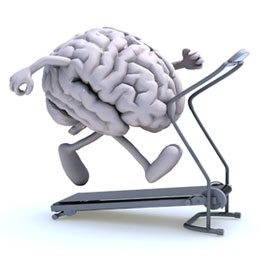 There is no escaping the evidence that regular moderate exercise is associated with a host of medical benefits. Among those benefits are perhaps improved memory and cognition, and questionably a decreased risk of developing dementia.
There is no escaping the evidence that regular moderate exercise is associated with a host of medical benefits. Among those benefits are perhaps improved memory and cognition, and questionably a decreased risk of developing dementia.
The latest study to show this correlation involved younger and older adults who wore a step-monitor. The number of steps they took during the study interval was then correlated with their performance on neuropsychological testing. The researchers found that for the older adults, but not younger adults, more physical activity correlated with better overall cognitive performance, but especially for face-name recognition.
This is a small study, with 60 subjects total. Also, the study is correlational only. It is possible that healthier older adults are both more physically active and cognitively nimble, because of underlying biological fitness. More cognitively active older adults may also be more physically active – the lines of cause and effect are plausible in multiple ways.
However, we do have a fairly large literature to draw upon to explore this question further. For example, studies looking at the acute effects of aerobic exercise find that it improves some types of cognitive function immediately.
There is complexity in interpreting the research due to the fact that there are many subquestions to sort through. Studies can look at all adults, only older adults, healthy adults, adults with minimal cognitive impairment, or with dementia. They can look at any exercise, or at aerobic fitness. And there are a large number of cognitive outcomes they can measure.
A literature review
A 2008 Cochrane review concluded:
There is evidence that aerobic physical activities which improve cardiorespiratory fitness are beneficial for cognitive function in healthy older adults, with effects observed for motor function, cognitive speed, delayed memory functions and auditory and visual attention. However, the majority of comparisons yielded no significant results.
They go on to recommend greater standardization among researchers, focusing on a few cognitive tests so results can be more comparable.
A more recent 2015 review found:
Results indicated that physical exercise may benefit cognitive function among older adults who have MCI [mild cognitive impairment], including improvements in global cognition, executive function, memory, attention, and processing speed. Physical exercise may also positively impact the physiology of the aging brain. However, evidence surrounding the characteristics of effective physical exercise interventions in terms of exercise type, intensity, duration, and frequency remains limited.
Newer studies continue to find a correlation, and even causation with intervention trials, in which some type of physical activity improves some cognitive measures.
The studies on older subjects with MCI reported some positive effects of physical exercise on cognition, mainly on global cognition, executive function, attention and delayed recall.
They also call for more rigorous trials with prospective intervention designs to better establish cause and effect.
The reviews make several consistent points:
- There does appear to be a consistent association between physical activity and some kinds of improved cognitive function in older adults who are either healthy or who have minimal cognitive impairment. The data for adults with Alzheimer’s disease is trending negative.
- Because of the large number of variables, the literature is a bit challenging to interpret, and everyone agrees that more rigorous trials are needed to clarify which types of exercise yield benefit (if the benefits are specific to any types of exercise).
The bigger picture
The meta-lesson here is understanding how challenging it is to answer a specific clinical question with high quality research. Even a question that seems rather straightforward at first – does exercise improve memory or cognitive function? – turns out to be very complex and difficult to answer.
We also see a very familiar pattern emerge: the preliminary literature shows results that are highly variable, but are trending in one direction. This preliminary literature is most useful for indicating if more rigorous research is worth the effort, and also helps clarify how to design more rigorous studies.
Eventually, over years and many studies looking at the question in different ways, a clearer picture begins to emerge. Still, the results need to be interpreted with caution and with an understanding of the limitations of clinical research.
Even with a highly plausible and uncontroversial putative effect, such as the effects of exercise on cognition, we can see this familiar pattern. These lessons need to be remembered with more controversial, ideological, and emotional medical questions.
Conclusion: Regular exercise probably helps you think
At this point I would say that there is probably a beneficial effect from physical activity for cognitive function in older adults who are either healthy or have mild cognitive symptoms. Benefits for full-blown dementia are less clear, but have not been ruled out.
Given what we know about exercise physiology, a benefit is highly plausible. In addition, there are a host of well-established other benefits, and that the risks of getting regular moderate exercise are low. Therefore, it seems obvious to recommend regular exercise for both overall and mental fitness.
Further research may or may not clarify which types of exercise have the most benefit. It may not make a significant difference – it may just turn out that any exercise is better than being sedentary.
Finally, for those interested in science-based medicine in general, it is a good practice to pick a very narrow and uncontroversial question and then carefully examine the research to see how the experts address a question, how the literature evolves over time, and the strengths and weaknesses of different kinds of studies.
These are basic critical thinking skills to have, and may be easier to learn when not clouded with the emotional blur of a highly charged issue.
